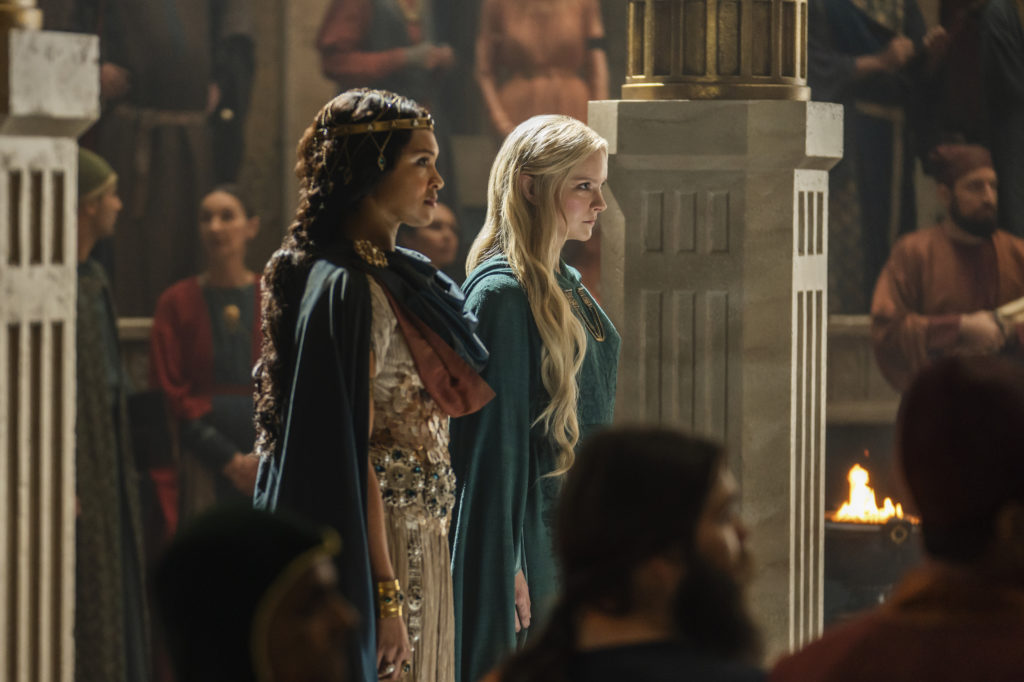
In the fourth episode of The Rings of Power, the Tolkien references come flying at us in a veritable barrage of historic figures and long-forgotten lands, which means our ability to remember how to type an accent mark, an umlaut and a caret gets quite the workout. Tar-Miriel has a dream of a great wave engulfing Númenor. In the streets below, Tamar, the guy Halbrand beat up after stealing his guild badge, is preaching anti-Elf sentiment to a restless crowd. We meet Pharazon’s son Kemen, who dresses like Caligula and informs his father of the unrest in the street. Pharazon gives him a lecture about the importance of statecraft and how clever men have low ambitions. We suspect Pharazon likes to give a lot of lectures about how he’s right in everything. Meanwhile, the crowd gets upset over Elf workers taking their jobs, which is perhaps the writers getting a little too pleased with themselves for working modern political rhetoric into the story. Tamar goes on to characterize these Elven job-stealers as workers who don’t sleep, tire or age, which is what the Númenorans really don’t like about them. They are the kingdom of men closest to Aman, the promised land of the Elves, where they return for their final rest. That proximity to elven power, elven magic, and the tantalizing prospect of elven immortality is what their enmity toward the elves is mostly about, although the show isn’t choosing to underscore that too much. Tamar accuses the queen of being an Elf-lover, just like her father and leads the crowd in chants of “Elf-lover” which compels Pharazon to address the increasingly angry crowd. “We are sons and daughters of the Edain,” he says, appealling to their national and racial pride “What elf could threaten us?” He vows that Númenor will remain a kingdom of men and buys everyone drinks. Pharazon’s son makes a play for Eärien Elendil’s daughter and we’re even less interested in this storyline than she is.
“You vex me, Elf.” Galadriel has presented Tar-Miriel with her findings from the Hall of Lore, including the bit about Halbrand being a lost king, “A lost heir in exile of the throne of the Southlands,” she calls him, which kinda sounds like Galadriel is just making up a kingdom out of nothing to suit her own goals. “With your backing they might unite behind his banner.” She pleads with the Queen-Regent to help her in the fight against Sauron. “To reforge the alliance between Numenor and Elves.” “Numenor has chosen another path,” the Queen-Regent tells her. Galadriel is furious and plays a dangerous card. She demands an audience with Númenor’s “true ruler,” the King. Miriel’s not having it and suggests that Galadriel is a castaway from her people, grasping at anything in a tempest to hold on to. “There is a tempest in me!” the haughty Elf bellows back. “It swept me to this island for a reason and it will not be quelled by you, Regent.” She practically spits out that last word. This lands her in the cell next to Halbrand, of course. Meanwhile Isildur sabotages his chance to be a sailor and winds up ruining his friends’ careers in the process. We confess, we don’t quite get this storyline, largely because we’re not interested in it. Seems kind of a shame that they turned Isildur into such a dull character.
In the Orc encampment in the Southlands, Arondir comes face to face with Adar, who appears to be an Elf. It’s notable that the orcs here use bones and animal skulls as armor, which indicates just how primitive their culture is at this point. Adar tearfully ends the suffering of a wounded orc before turning to his captive. He asks Arondir in Elvish where he was born. Arondir mentions Beleriand. “By the mouth of the river?” Adar asks. “I went down that river once when I was young.” It should be noted that Beleriand was destroyed in the War of the Wrath centuries before, which indicates both age and a familiarity with Elven realms on Adar’s part. Arondir asks why the orcs call him father. “You have been told many lies,” the mysterious figure replies. “Some run so deep even the rocks and roots now believe them. To untangle it all would almost require the creation of a new world. That is something only the gods can do. I am no god; at least, not yet.” Adar frees Arondir to send a message to the Southlanders who went to the old watchtower.
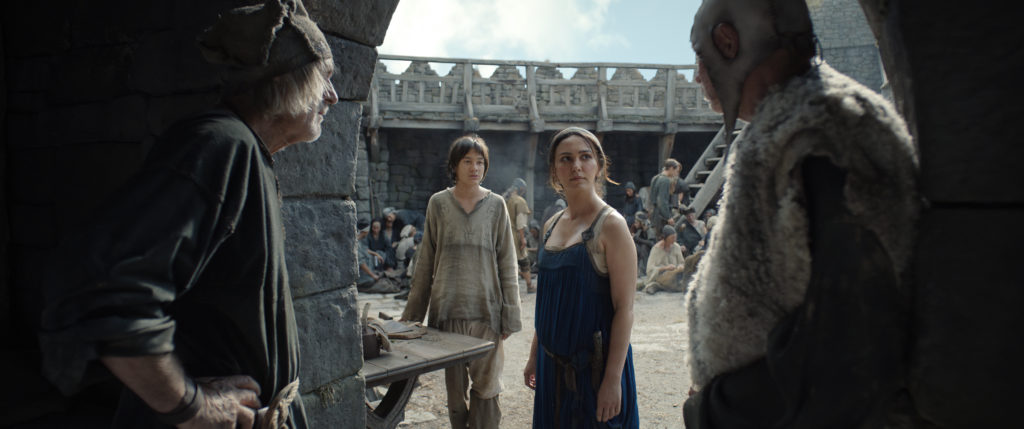
We should pause her for a second and mention that “The Southlands” are pretty clearly going to become Mordor, which makes all of the shots of the beautiful, verdant countryside and charming rustic villages just a little poignant. The Elven watchtower that all of the Southlanders go to could be any number of watchtowers that survived to Frodo’s day, like the one at Cirith Ungol, where the orcs captured Frodo and Sam eventually rescued him. Anyway, in the “present” day, things aren’t looking great for the human refugees at the watchtower, since they’re running low on food and the people are starting to get restless. An old man named Waldreg challenges Bronwyn’s authority when she suggests implementing rations. Theo suggests getting a party to go back into the villages in the day time to gather food and more supplies. Bronwyn won’t have it, but Theo is clearly walking a darker path. “I’m sick and tired of watching everything go to tatters and not doing anything about it.” Waldreg observes the whole argument. Disobeying his mother, Theo takes his friend Rowan and goes back to the village. After loading up a cart and several sacks, he decides to check out a dark, deserted cabin, because that’s such a great idea. A shadow passes over the village and Rowan takes off. An orc attacks Theo and he brandishes the blade, which brands his forearm with a mark and flares up, restoring to full size. This suddenly explains what all of the orcs have been looking for. We don’t think we’ve mentioned this yet, but this is almost certainly some sort of Morgul blade, much like the one that wounded Frodo permanently on Weathertop in The Fellowship of the Ring. Theo hides in a well because Orcs really aren’t very clever creatures.
In Eregion, Celebrimbor and Elrond watch the tower being built by the dwarves and marvel at their speed and skill. Celebrimbor tells Elrond he’s the very image of his father, who will be brought up several more times this episode. “He had that way of seeing, far off.” The older Elf remembers that his old friend once told him that one day “my future will be in his son’s hands.” He’d forgotten that until this moment. “Isn’t that odd?” he asks a little strangely. Yes, that’s a little odd. We don’t entirely trust him, but right now, Celebrimbor is unsettled because Durin is either avoiding him or hiding something. Elrond goes to visit Disa to find out what’s going on. She makes excuses and is clearly covering for her husband. Elrond calls her out on it. “Calling a dwarf dishonest in her own home? That’s a recipe for strong gravy.” Sophia Nomvete is fantastic in the role and we think her character design ranks among our favorites, but there’s something a little underwhelming or unimaginative about her portrayal. She’s supposed to be a high princess, in line to be the next queen, with unusual and revered abilities to communicate with the stone, and yet she’s shown here rooting through some potatoes and barking at her unruly children, like the working class Scottish woman her accent tends to imply. She reports the whole conversation to her husband, who’s impressed by her ability to cover for him and tells her, “We’re making good progress in the old mine.” Elrond, with his Elf eyes and Elf ears, listens to the whole conversation and realizes that the Dwarves are secretly mining under Mirrormere, the lake outside of Khazad-dûm. He goes there and – we’re not entirely sure how he makes this connection – knocks on the stone while reciting the song Durin’s kids were singing earlier (“Rich crone, kiss the stone/Polish your gems and gold“) which opens a secret chamber where an active mining operation is under way. This evokes the use of language to open doors in Khazad-dûm as seen in The Fellowship of the Ring, when it took Gandalf some time to figure out what word opens the Doors of Durin. It also tends to support the idea in this adaptation that the Dwarves considers themselves capable of literally communicating with the stone of the mountains. Durin confronts Elrond in the secret mine and expresses disbelief that he doesn’t know what they’re mining for. The Dwarves are naturally suspicious of outsiders and assume everyone wants what they have. We saw this not only in Gimli’s slow warming up to Legolas in the film trilogy, but it was the entire basis for Thorin Oakenshield’s arc in The Hobbit (although he eventually went mad with dragon sickness). This is why Durin can be so warm to Elrond and then immediately talk about him suspiciously behind his back. He’s not a bad Dwarf. He’s just a Dwarf. This is how they are. He makes Elrond swear an oath of secrecy, “Hand to mountain.” Durin promises him that the mountain will make life miserable for him and his family for all eternity should he break his oath to it. “I swear on the memory of my father, Eärendil the Mariner, anything you tell me here will end in my ears alone.” Durin reveals what we honestly should have seen coming, the discovery of Mithril. “This could be the beginning of a new era for our people,” Durin says in that stunted sort of prequel-ese, where a character talks in heavily ironic foreshadowing. The deep mining of Mithril will eventually cause the Dwarves to wake the sleeping Balrog, also known as “Durin’s Bane,” which will ultimately doom all of Khazad-dûm. Elrond is intrigued by the beautiful ore, but assures Durin he has no plans for taking it. Then there’s a mine cave-in because of course there is. This development adds little to the overall story except to show Disa singing to the mountain (which was, admittedly, a powerfully beautiful scene) and give King Durin a reason to put the kibosh on further Mithril mining, but boy do they ever milk it for drama.
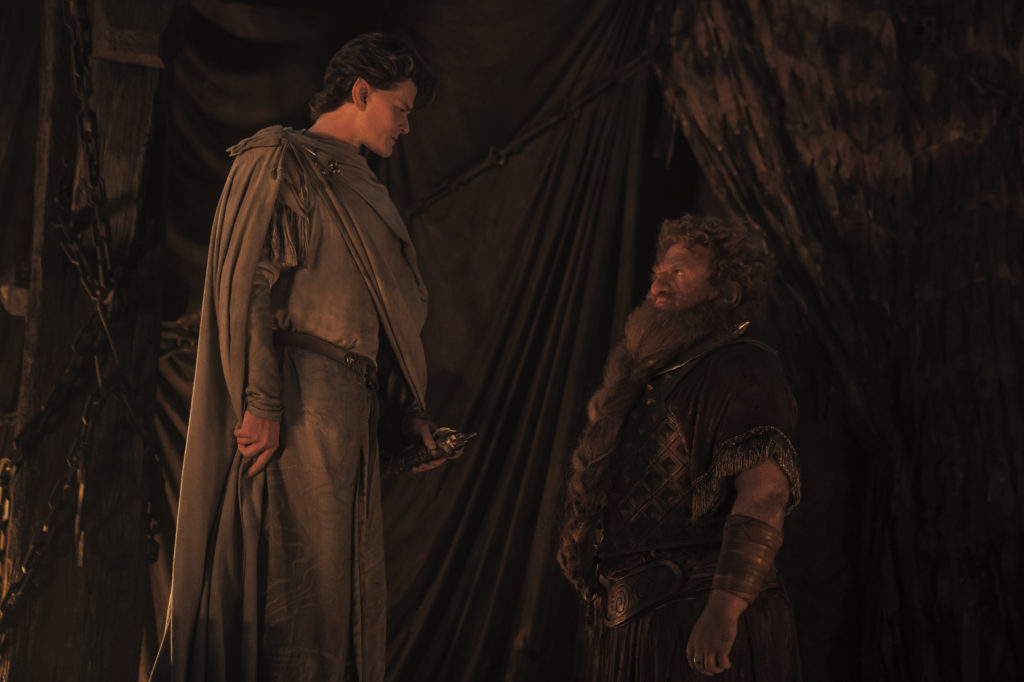
In Númenor, Eärien, Elendil’s daughter spills water all over Kemen, Pharazon’s son and we couldn’t care less about these characters. Meanwhile, Galadriel is stewing in her (literal) gilded cage. Halbrand, in a neighboring cage, challenges her. “Does it ever occur to you that you’re not battling trolls or orcs, but men?” She scoffs at the idea of this man advising her on the art of war, but he counters that a queen’s court is not the kind of battlefield she’s used to. Intrigued, she asks him to go on. He explains that in a situation like this, she should figure out what it is her opponent most fears and “give them a means to master it, so you can master them.” This isn’t just sharp diplomacy, it is seriously, alarmingly manipulative. This makes a good time to point out that there is a theory going around the fandom that Halbrand may actually be Sauron. We wouldn’t normally make note of every theory surrounding a puzzle box of a show like this, packed with as many Easter Eggs and references as this one, but that is, in essence, the major question hanging over this series. Not just where is Sauron, but who is Sauron? He went by many names and took many forms, one of which spent a great deal of time in Númenor, manipulating local sentiments against the elves and causing unrest which would ultimately lead to the fabled kingdom’s downfall. Since we’re clearly supposed to spend our time wondering who Adar is or who the man who fell from the sky into Nori Brandyfoot’s life is, it’s perhaps worth speculating that our attention as viewers is being manipulated away from the man who’s walking around in the rather obvious (and ultimately, distractingly familiar) trappings of Aragorn, who always acts like he doesn’t care about the world but seems to spend a lot of time affecting it and manipulating it. Remember that Galadriel thought there was a higher power at work when they were brought together, and remember also that Halbrand more or less doomed his fellow castaways when the wyrm attacked them. Remember that Galadriel is convinced that Halbrand will become the ruler of the Southlands, which we just mentioned are almost certainly where Mordor will eventually lie. We’re just saying.
Halbrand gets Galadriel to realize that the Queen-Regent threw her in her cell because she asked to speak with her father, but we thought that was more than obvious? At that exact moment, Pharazon arrives to announce that Galadriel is to be shipped off to the Elves immediately. They let Galadriel out of her cell and she strong arms all of the guards into it somehow. Pharazon lets her leave, knowing he can’t do a thing to stop her. Galadriel breaks into the tower to confront the king, only to find Tar-Miriel waiting for her along with her weak and ailing father. Galadriel is chastened by the sight of the Queen Regent caring for her father. “Forgive me. I did not know.” Tar-Miriel makes it clear she would like this information kept a secret and Galadriel demands a truth in return. She asks her why she’s turned against the elves when her father was so loyal to them. Tar-Mirel explains how her father lost the faith of the people when he announced plans to renew relations with the elves. She was chosen to rule in his stead. On the night he was deposed, he took her to a palantír to show her a vision of the kingdom’s destruction. Yes, this is the same sort of seeing stone that Saruman will one day deploy in Orthanc to communicate with Sauron, that Pippin will one day try to steal for a minute, and that Aragorn will use to warn Sauron that the heir of Elendil is coming for him. The palantíri were gifts to the Númenorans from the elves, although many were lost over time. Tar-Miriel starts to warn Galadriel about what she’s going to see, to which the Elf haughtily replies “I have touched palantíri before.” We loved how the vision is initiated by the visual of an exploding palantír. Galadriel sees the destructive wave that lives in Miriel’s nightmares. The Queen-Regent tells her that the vision begins with Galadriel’s arrival, which is why she’s having her sent away immediately. She fears that the unwelcome Elf will set in motion the events that eventually lead to Númenor’s destruction. Galadriel says her decision is based on fear and says she knows what it is “to be the only one; the only one who sees, the only one who knows.” Miriel is moved by her words, but she won’t change her mind.
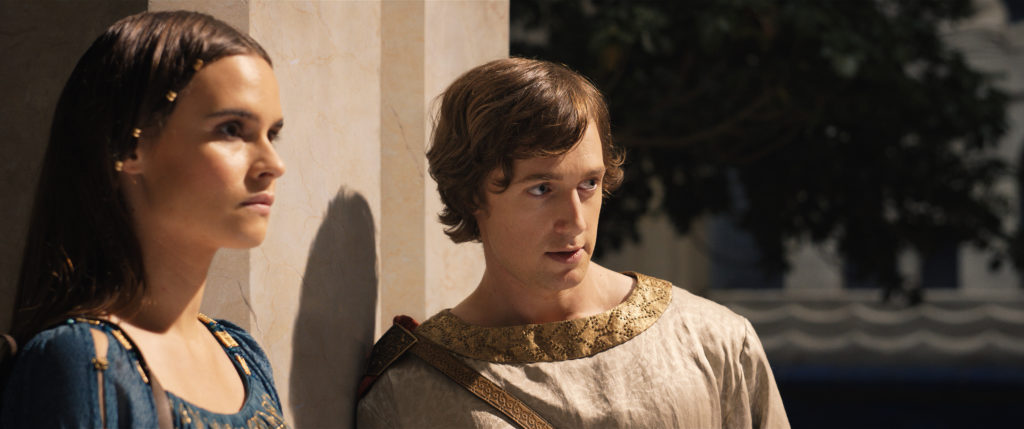
Arondir rescues Theo from the orcs and they are chased through the woods in a sequence that deliberately evokes the Jackson films, lots of slow motion and children’s choir vocals, although we will cop to the fact that we find these little aesthetic callbacks to be comfortingly familiar. Ismael Cruz-Cordova gets to show off more of his smooth Legolas-like moves, like catching a fired arrow and firing it back at the encroaching orcs. Somehow, Bronwyn comes upon them in the woods and the three of them make their way out into the sunlight, where the orcs can’t follow. At the watchtower, Arondir relays Adar’s message to Bronwyn. Her people may live if they foresake all claim to these lands and swear fealty to him. Waldreg reveals that he knows he stole the hilt from his barn and shows Theo the mark on his arm, which matches his. “It is no sword. It is a power fashioned for our ancestors by his master’s own hand. A beautiful servant. He who was lost but shall return.” He tells him that Sauron is coming and refers to the shooting star they all saw. “It means his time is coming,” which is just vague enough that it could either mean that the man who fell from the sky is Sauron or that the man who fell from the sky is a response to Sauron’s return. Either way, Theo’s pretty screwed. Meanwhile, the orcs report to Adar that the weapon they’re searching for is in the tower, which means everybody’s screwed.
In Khazad-dûm, Disa sings to the mountain, trying to convince it to release the trapped dwarves. It’s a pretty interesting take on Dwarven culture. All of the trapped Dwarves are rescued but Durin is furious with his father for shutting down the Mithril mine and briefly wishes him dead, which leads Elrond to talk about his own daddy issues. He tells Durin to cherish the time with his father while he still has it, but it comes off way more like Elrond saying that it was tough having a father who did such legendary deeds as Eärendil the Mariner, who now rides across the heavens with a star on his brow (and whose light will be gifted to Frodo by Galadriel and will eventually help keep Frodo and Sam alive while fighting Shelob in Cirith Ungol). It’s a lot to live up to, we suppose. There appears to be something of a focus on Elrond’s family tree, what with the repeated mentions of his father and his brother Elros, who was the first king of Númenor. Durin goes to see his father and ask forgiveness for lashing out at him. His father tells him he will always be with him, even in anger, and that there is nothing to forgive. It’s nice to see at least one healthy parent-child relationship on this show. They discuss their suspicions of Elrond and agree that Durin should accompany him back to Lindon to find out more.
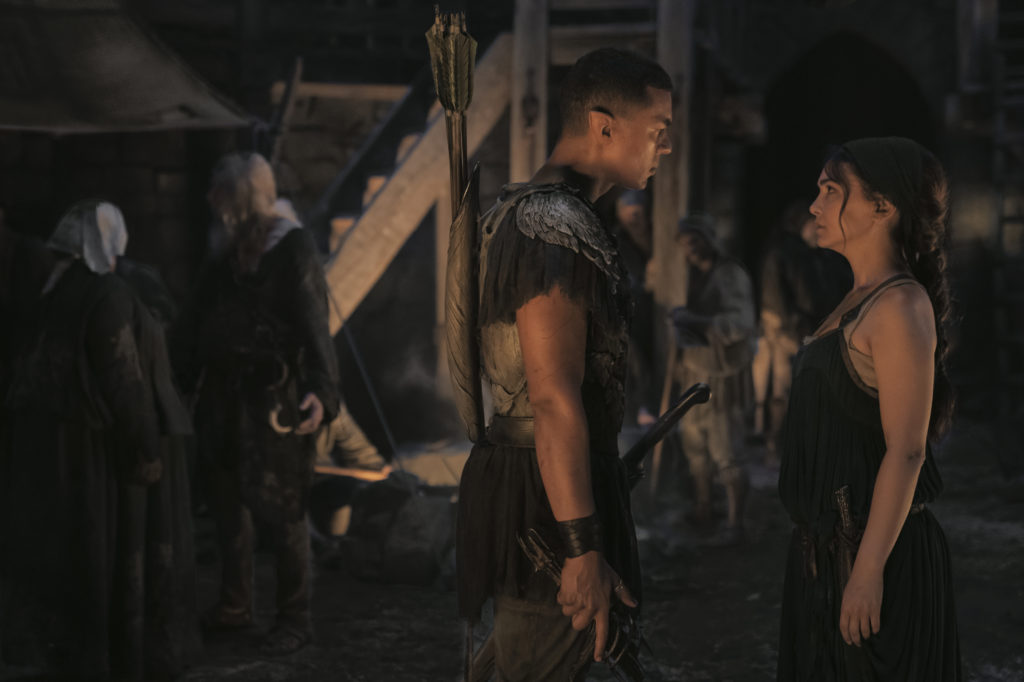
In Númenor, Galadriel is voted off the island and a crowd gathers to watch her go, including Tar-Miriel. As Galadriel sails away, the petals of the white tree begin to fall, just as in Miriel’s vision, just as she once referred to them as “the very tears of the Valar themselves,” which she also called a warning and a judgment. She takes this as a message from Númenor’s angelic benefactors that turning this daughter of the House of Finarfin away from their help now is what will ultimately doom them. Tar-Miriel changes her mind and agrees to go with Galadriel to fight Sauron, making an impassioned plea to her subjects to follow her. Many Númenorans show their support but we’re not sure why they’d suddenly be into this when they were screaming “Elf-lover” in the streets at the top of the episode. Isildur and his pals step forward to serve as the queen’s guard on this mission and Halbrand, free from his cage, wanders the soon-to-be Queen-less city alone.
THE WOMAN KING Star Viola Davis for ELLE Brazil Magazine Next Post:
Viola Davis at THE WOMAN KING Special Screening at the National Museum of African American History and Culture
Please review our Community Guidelines before posting a comment. Thank you!



